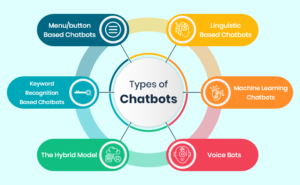Table Of Content
ToggleWhat is a Chatbot?
A chatbot is an application that allows users to have conversations in their own language through mobile apps, websites, texts, telephone calls, or messages. It acts as a tool that facilitates the exchange of words between a computer and a user. In simple terms, it’s a way for humans to interact with digital devices using text or voice, making the interaction feel human-like. For example, when you visit a website and a chat window pops up offering help, that’s a chatbot in action.
Types of Chatbots

Image Credit: https://www.mavencluster.com/blog/complete-chatbot-guide/
-
Hybrid Chatbots: These understand the context and intent of conversations, making it easy for organizations to interact with customers. They combine simple, rule-based functions with smart, context-based functions.
-
Button-based Chatbots: Popular in the market, these chatbots help solve frequently asked questions by presenting options in the form of buttons.
-
Machine Learning Chatbots: These use Artificial Intelligence (AI) and Machine Learning (ML) to remember and learn from past conversations.
-
Voice Bots: Increasingly popular, these chatbots use voice recognition technology. Examples include Amazon Alexa and Apple Siri.
Benefits of Chatbots
-
Immediate Availability: Chatbots are available 24/7, providing instant answers to user questions. If a chatbot cannot answer a question, it forwards it to a human employee who responds by the next business day.
-
Increased Sales: Providing the right information at the right time can significantly boost sales. Companies using chatbots have seen sales increase by over 65%.
-
Improved Customer Engagement: Chatbots enhance customer interaction with products and services, leading to better engagement.
-
Cost Savings: Chatbots are a cost-effective alternative to hiring employees, as they can handle multiple customers simultaneously.
-
24/7 Customer Service: Chatbots offer round-the-clock service, providing immediate responses regardless of the time.
-
Enhanced Customer Satisfaction: Customers appreciate the quick and efficient service provided by chatbots, leading to higher satisfaction levels.
Popular Chatbot Platform Tools
-
Chatfuel: Offers a large library of templates for platforms like Messenger, Instagram, and Facebook. Free and paid plans available.
-
Aivo: Supports over 50 languages and offers voice functionality. Comes with a 30-day trial period.
-
WotNot: Provides both chatbot and live chat tools, allowing human intervention when needed.
-
MobileMonkey: A popular Facebook Messenger platform that helps in lead generation and marketing campaigns.
-
SnatchBot: Offers over 48 templates in multiple languages, with various purchase options but no free trial.
-
Botsify: Easy to use with support for multiple channels. Offers a 14-day free trial.
-
Flow XO: No coding required, supports multiple channels with a drag-and-drop editor.
-
BotKit: Ideal for creating custom integrations, chatbots, and apps. Free to use with a signup.
These tools help businesses leverage the power of chatbots to improve customer service, engagement, and overall efficiency.
Conclusion
In conclusion, chatbots have become an essential tool for businesses to improve customer service, engagement, and efficiency. They offer immediate availability, cost savings, and enhanced customer satisfaction. With various types of chatbots available, from hybrid to voice bots, companies can choose the best fit for their needs. Popular platforms like Chatfuel, Aivo, and MobileMonkey make it easy to implement and customize chatbots. As technology advances, chatbots will continue to evolve, providing even more opportunities for businesses to connect with their customers in meaningful ways.
